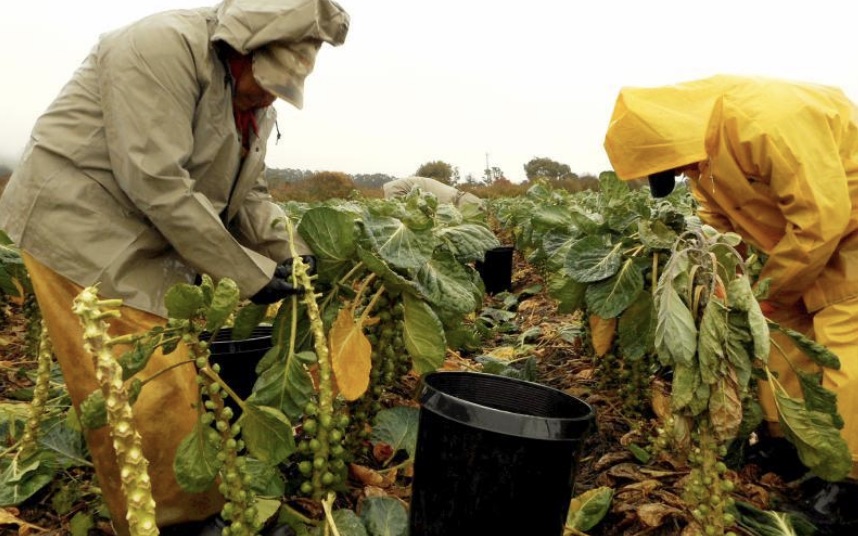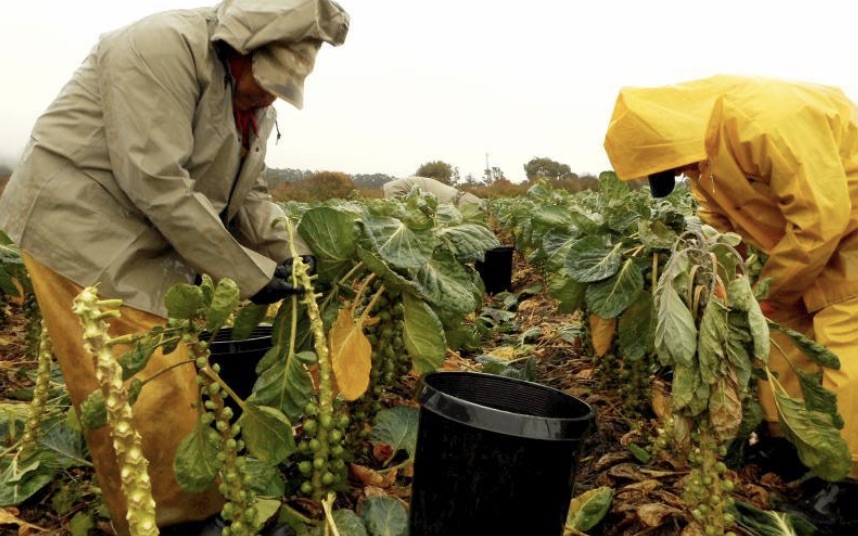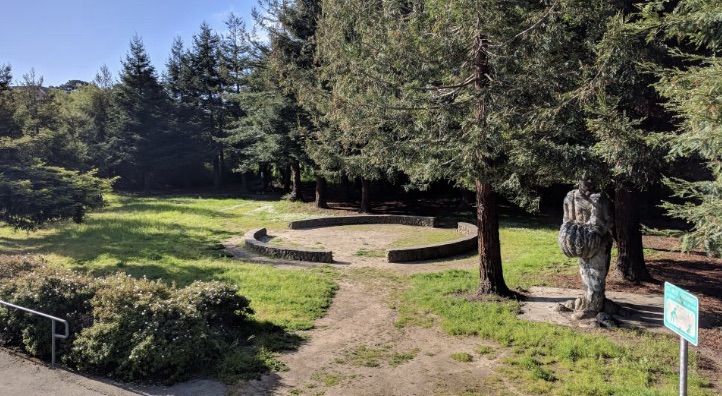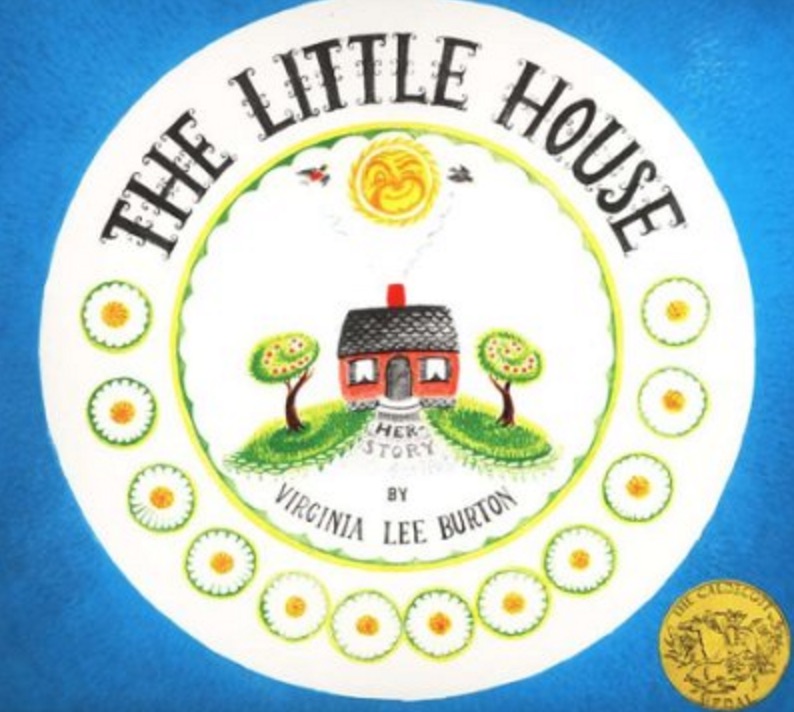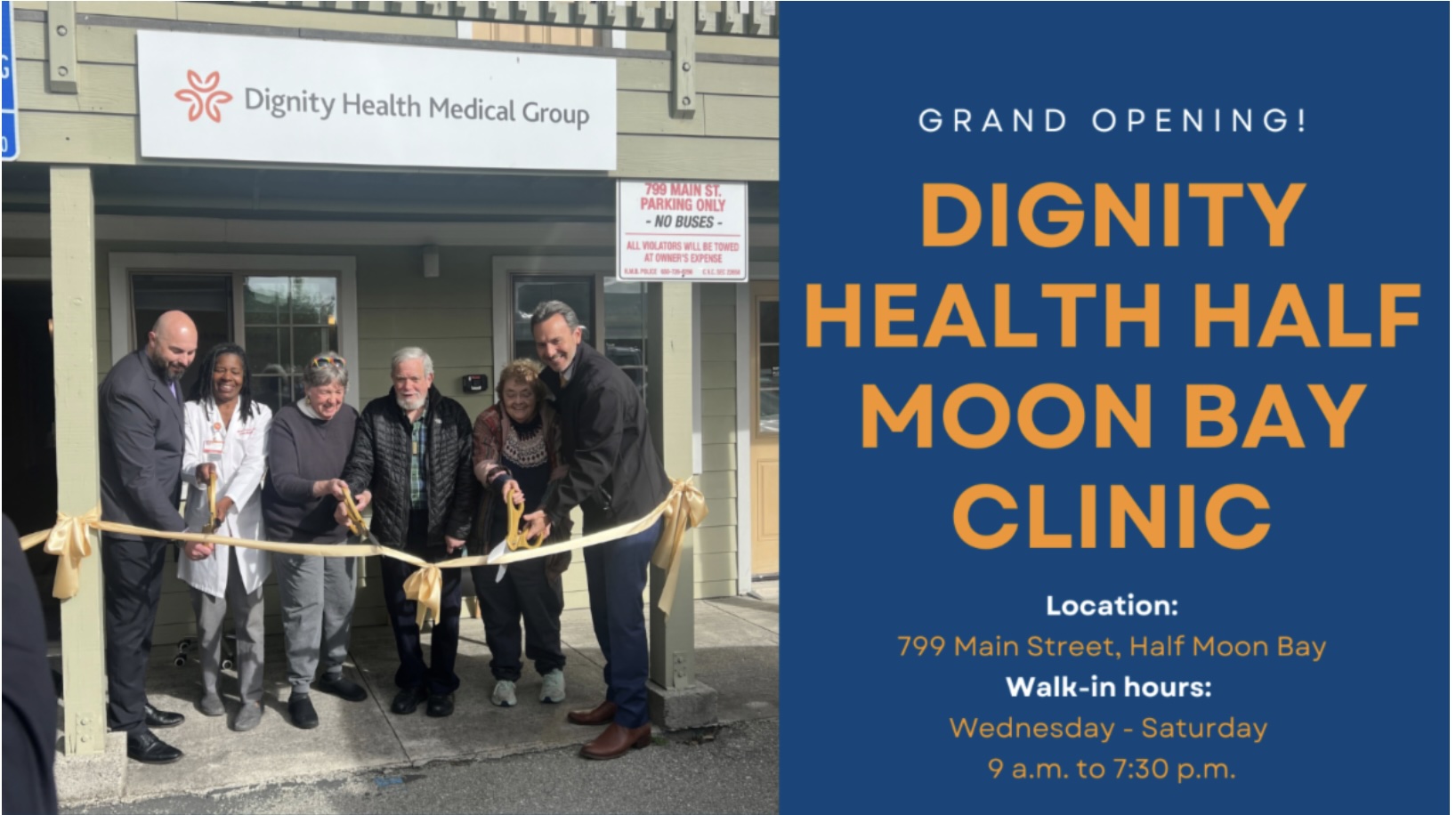|
Getting your Trinity Audio player ready...
|
STAFF REPORT.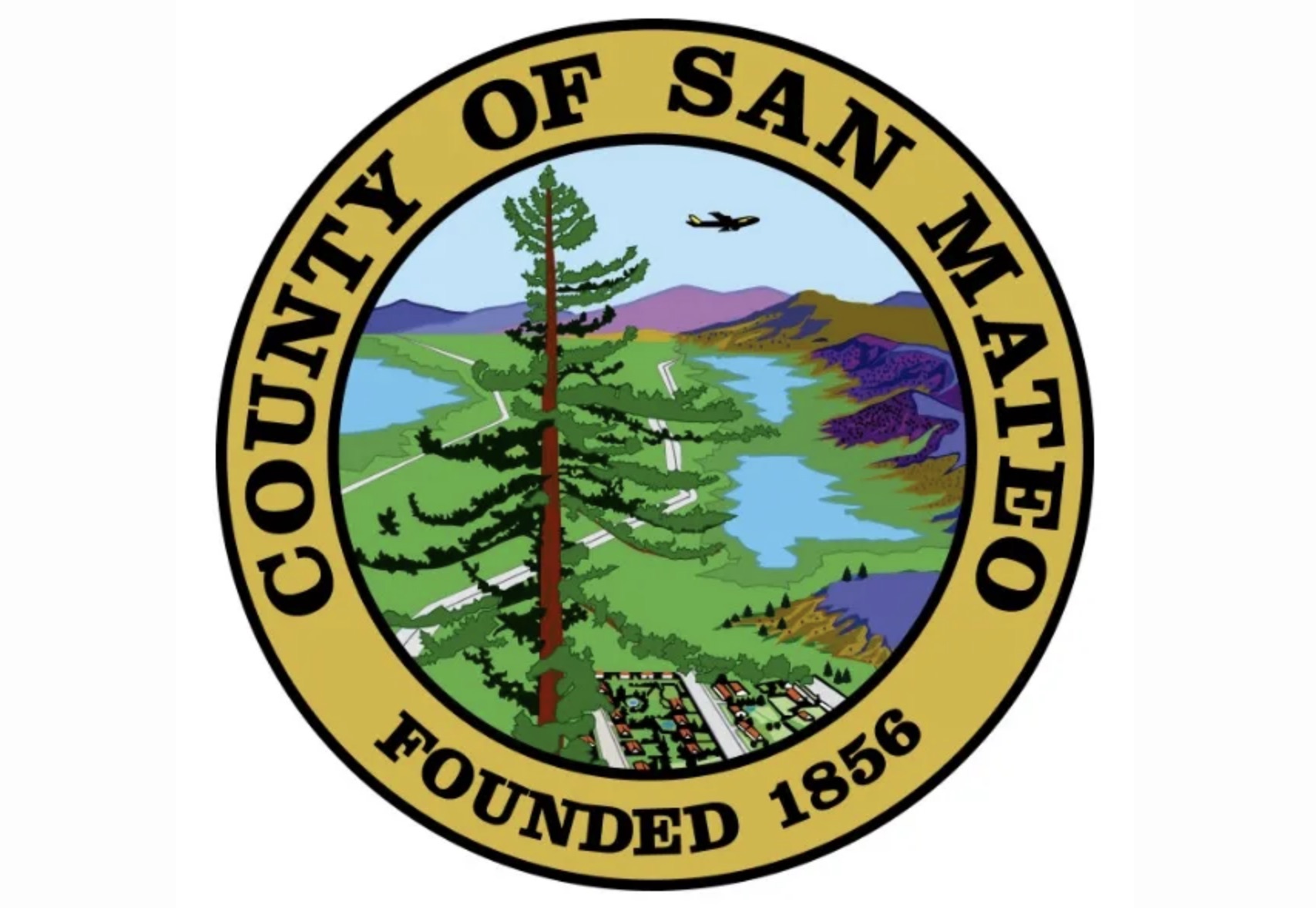
To: Honorable Board of Supervisors
From: Supervisor Don Horsley, District 3
Subject: Appointments to the Agricultural Advisory Committee
RECOMMENDATION:
Recommendation for appointments to the Agricultural Advisory Committee, each for an initial partial term ending September 30, 2025:
A) Ryan Casey, representing Farmer/Growers; and
B) James Oku, representing Farmers/Growers; and
C) Jonathan Winslow, representing Public member.
BACKGROUND:
The Agricultural Advisory Committee actively assists in the preservation of agriculture throughout San Mateo County through advice and recommendation to the Planning Commission and the Board of Supervisors.
DISCUSSION:
Ryan Casey, James Oku, and Jonathan Winslow are being recommended for appointment on the Agricultural Advisory Committee each for an initial partial term ending September 30, 2025 to seats formerly held by Robert Marsh, BJ Burns, and Cynthia Duenas, respectively.
Ryan Casey is the owner and operator of Blue House Farm, in business since 2005 in Pescadero. He is dedicated to making an agricultural farm successful in the hectic and challenging world of contemporary farming. He also has been able to participate in upgrading farmworker housing through a San Mateo County Housing initiative, something that could be helpful for future farmers to learn. Ryan brings a fresh eye to an age-old profession and would be extremely helpful in advising the Board of Supervisors on agricultural issues.
James Oku is the General Manager of Oku Inc., a longtime family farming company in San Mateo County. He has been involved in operating two cut flower wholesale stores as well as all aspects of overall farm operation. His background also includes membership on the Farm Bureau for San Mateo County. His historic Pescadero family farm has been involved in cut flowers, deep water hydroponic greens and more recently, cannabis cultivation in San Mateo County. He is a member of the Coastside Cannabis Coalition. He has a deep connection to the San Mateo County agricultural scene and as a local farmer in his early 30’s, he will bring a forward-thinking vision to his role as an advisor to the Board of Supervisors on agricultural issues.
Jonathan Winslow is uniquely qualified to represent the public on the Agricultural Advisory Committee. He has an extensive educational background and professional experience in biological testing of soils related to pest management and soil fertility, giving him a deep understanding of complex issues facing farmers. A lifelong resident of the San Mateo County Coastside, he has an appreciation for the special challenges affecting the local agricultural landscape. His scientific and professional experience will be especially helpful in advocating for the future of agricultural support on the Coastside and helping the Board of Supervisors understand the varied nuances of the agricultural environment and its community.
FISCAL IMPACT:
None.
San Mateo RCD Builds a Reservoir on Blue House Farms Doubling San Gregorio Creek’s Volume in Dry Season

The San Mateo RCD (Resource Conservation District) and its partners build a reservoir on Blue House Farm so Ryan Casey and the wildlife in the creek have more water during the drought.
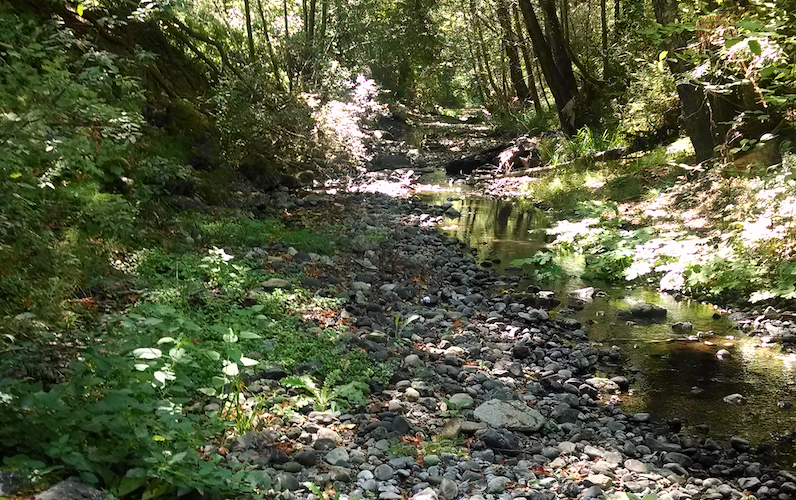
San Gregorio Creek near Blue House Farm runs dangerously low during a drought. The RCD and partners built a pond for farmer Ryan Casey so he can continue irrigating his fields while not withdrawing from the at-risk creek. The pond can hold 30 acre-feet of water (nearly 15 olympic swimming pools in size)—enough for three to four months of irrigation.
In the middle of one of the worst droughts in California’s recorded history, parched grass and dry soil give way to a creek that is still running. A lucky passerby might catch a silver flash of steelhead trout; an even luckier one might see the neon blue of a San Francisco garter snake slithering through the reeds to search for its favorite prey—California red-legged frogs. Just a few summers ago, the scene looked quite different. Anxious farmers like Ryan Casey struggled to balance the competing demands of irrigating his crops and his desire to leave water in the creek for wildlife. Since then, Ryan, owner of Blue House Farm, has worked with the San Mateo Resource Conservation District (RCD) and its partners to build a pond and increase his irrigation efficiency, which allows Ryan to continue irrigating through the drought while not taking water from the creek during the driest period. This was a win-win project, improving Ryan’s water security while protecting streamflows for wildlife like threatened steelhead trout and the rare and endangered coho salmon.
The trickling flows in the creek are protected thanks in part to a 30 acre-foot pond (nearly 15 olympic swimming pools in size) full of water from winter storms, standing defiantly in the face of the dry golden hills staring down at it. While the logic that makes the reservoir work is breathtakingly simple, planning and building it took years of effort and cooperation by Ryan, the San Mateo RCD, Trout Unlimited, the Natural Resources Conservation Service (NRCS), Peninsula Open Space Trust, and many more.
The logic is this: if Ryan can divert and store water from the creek during wet winter months, he can use it to irrigate his crops in the summer months, leaving every drop of water possible in the creek during the dry season. According to Jarrad Fisher who manages the RCD’s Water for Farms, Fish and People Program, Ryan’s reservoir and others the RCD has built collectively form a support system that can effectively double the creek’s volume in the dry season.
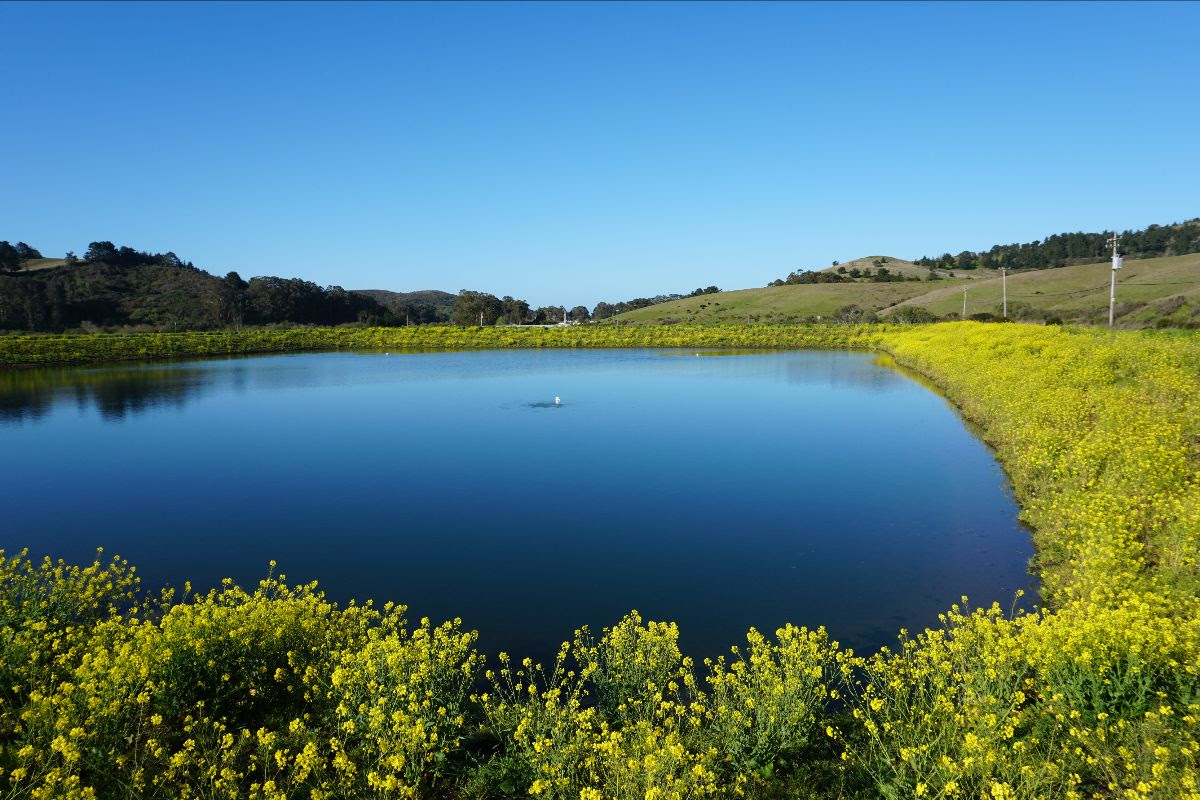
The reservoir on Blue House Farms that the RCD and partners built allows farmer Ryan Casey to fill it in the winter and use in the summer when the flows are low. The reservoir can hold 30 acre feet of water (nearly 15 olympic swimming pools in size), leaving more water in the creek for wildlife.
That’s great news for steelhead trout and coho salmon. Full creeks give these fish access to their favorite deep, cold water where they can feed and avoid predation. They can also swim back to the ocean, completing their reproductive cycle and spawning future generations. Other threatened and endangered species like the California red-legged frog, the Western pond turtle, and the San Francisco garter snake also thrive when there is reliable water through the dry summer.
Overall, the Water for Farms, Fish and People Program has helped 25 local farms and 6 domestic water systems create 50 million gallons of additional local water storage capacity. In a summer where many farmers and ranchers will have to truck water onto the property or switch their crops out for less thirsty varieties, the program represents an increase in water security. However, water storage is not the end-all be-all solution for farmers and ranchers to weather the drought.
As Jim Howard, district conservationist for the NRCS in Half Moon Bay emphasized, “The bedrock of drought resilience for farmers and ranchers is long term planning. We can make changes here and there, but the efforts that really lead to success take time and commitment.”
The NRCS and the RCD are committed to helping farmers make those changes. They offer the technical assistance that farmers need to conserve, strategically manage, and store water. That means everything from finding and fixing leaks and broken drinking water pipes, to evaluating irrigation systems to improve water delivery and storage, to helping people navigate the complex, bureaucratic processes that make all of this work possible. But even more than all of that, the RCD and NRCS understand the art and the science of how to balance the need for water. Creating tailored, individual plans for each person they work with means that they can meet their water demands more efficiently, while leaving enough for people, fish, and farms.
If you are a farmer, rancher, or homeowner who would like to work with the RCD to improve water conservation on your land, please contact Joe Issel at joe@sanmateorcd.org.

Last fall, San Mateo RCD staff helped release 10,000 juvenile salmon into Pescadero Creek. More water in creeks increases the chance that they will thrive.

More than 90% of the San Mateo RCD’s budget comes from grants. Your donation is critical in filling the remaining gap to help protect the vitality of our landscape.Your tax-deductible donation is leveraged at about a 9:1 ratio, making it a very effective use of your charitable dollars.
With your support, the San Mateo RCD can help wildlife and farms thrive, combat climate change, and ensure clean and reliable water for the community.
Donate today
Did someone forward you this newsletter? You can subscribe by clicking this link.
San Mateo County Agricultural Advisory Committee (AAC)
Meetings ~ 2nd Monday @ 7:00pm

Watch remotely. Comments and questions by email.
Agendas and Zoom Links
The Williamson Act
The Williamson Act is a means to restrict the uses of agricultural and open space lands to farming and ranching uses during the length of the contract period. The Williamson Act Program was also envisioned as a way for local governments to integrate the protection of open space and agricultural resources into their overall strategies for planning urban growth patterns.
To this end, three principal objectives were originally outlined.
Protection of Agricultural Resources
Preservation of Open Space Land
Promotion of Efficient Urban Growth Patterns
AAC Members
Every 2nd Monday of the Month; 7:00pm-9:00pm
Contact
Summer Burlison
sburlison@smcgov.org
Tel: (650) 363-1815
Fax: (650) 363-4849
MISSION STATEMENT
The purpose of this Committee is to assist in the achievement of the objectives of the Planned Agricultural District Ordinance and the San Mateo County Local Coastal Program.
Membership
15 members, consisting of one Agricultural Business, one Conservationist, seven Farmer/Growers, two Public Members and four Non-Voting members (Executive Director, San Mateo County Farm Bureau; Executive Director, National Resource Conservation Service NRCS; County Director, UC Cooperative Extension; and County Agricultural Commissioner).
- Natalie Sare
1st Term
Jun 25, 2019 to Jun 30, 2022Title
MemberRepresenting
Farmer/Grower - Lauren Silberman
1st Term
Jul 10, 2018 to Jun 30, 2022Title
MemberRepresenting
Agricultural Business - Louie Figone
3rd Term
Aug 07, 2018 to Jun 30, 2022Title
MemberRepresenting
Farmer/Grower - William Cook
1st Term
Jul 10, 2018 to Jun 30, 2022Title
MemberRepresenting
Farmer/Grower - John Vars
1st Term
Jan 26, 2021 to Jun 30, 2024Title
MemberRepresenting
Farmer/Grower - Fred Crowder
Partial Term
Jan 11, 2022 to Jun 30, 2025Title
MemberRepresenting
Conservationist - Peter Marchi
1st Term
Aug 03, 2021 to Jul 01, 2025Title
MemberRepresenting
Farmer/Grower - Judith Humburg
1st Term
Aug 03, 2021 to Jul 01, 2025Title
MemberRepresenting
Public - Koren Widdel
1st Term
N/A N/ATitle
Non-VotingRepresenting
Agricultural Commissioner - Frank McPherson
1st Term
N/A N/ATitle
Non-VotingRepresenting
UC Coop. Extension - Jess Brown
No Term
N/A N/ATitle
Non-VotingRepresenting
Farm Bureau - Jim Howard
No Term
N/A N/ATitle
Non-VotingRepresenting
USDA Natural Resources Conservation - Don Horsley
1st Term
N/A N/ATitle
SupervisorRepresenting
Board of Supervisors


